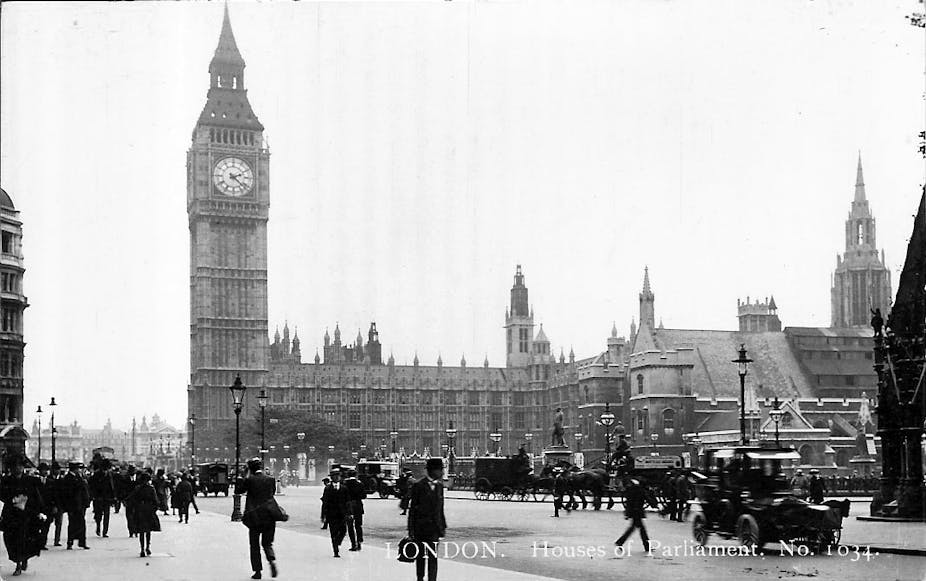On July 24 1914 the British cabinet met to discuss the diplomatic situation in Europe, which had deteriorated rapidly since the assassination of the Austrian archduke, Franz Ferdinand, a month before. An Austrian invasion of Serbia now appeared imminent, threatening to spark a regional military crisis that might easily escalate into a general war between the Great Powers.
The sense of foreboding in London was captured in a letter sent by the prime minister, Herbert Asquith, to his confidante Venetia Stanley. The situation was “about as bad as it can possibly be”, he wrote, and Europe now stood on the brink of “a real Armageddon”. Nevertheless, Asquith felt able to reassure Stanley. “Happily there seems to be no reason why we should be anything more than spectators.”
Eleven days later, on August 4, Britain declared war on Germany.
In retrospect, Asquith’s words seem strangely complacent. At the time, however, his assumption that Britain might stand aside from the looming European conflagration reflected the hopes and beliefs of a majority of his political colleagues and supporters. This, after all, was a Liberal government which had won a landslide general election victory in 1906 under the slogan of: “Peace, Retrenchment and Reform”. How, then, did such a government come to plunge Britain into a war of unprecedented destruction?

Some opponents of military intervention harboured suspicions that the secretive and aristocratic British Foreign Office – without the knowledge or approval of parliament – had pledged the nation to support France and Russia in a war against Germany. A new diplomatic understanding, the Entente Cordiale, had been concluded with France in 1904, followed by a similar diplomatic convention with Russia in 1907. Although originally intended to resolve a series of outstanding territorial disputes between colonial rivals, these arrangements had been supplemented, following an international crisis over Morocco, by a series of secret Anglo-French military staff talks, concerning the possibility of collaboration in a future war against Germany. The level of commitment implied by these talks, however, remained unclear.
As the Foreign Secretary, Sir Edward Grey, insisted in the House of Commons on August 2, the Entente was not a military alliance, and Britain remained under no formal obligation to support France or Russia with armed force in 1914.
In fact, the July Crisis initially caught the British authorities off-balance. At the start of the summer, the government was preoccupied with the looming threat of civil war in Ireland, where Nationalists and Unionists, divided over the prospect of Irish home rule, were assembling rival paramilitary forces. Even as darker war clouds gathered over the European continent, a majority in the cabinet, the wider Liberal Party, and the Liberal press, remained opposed to any British involvement in a confrontation between the Great Powers.

Indeed, the assassination of Franz Ferdinand provoked no small amount of sympathy for Austria-Hungary as the victim of a Serbian terrorist “plot”, and British opinion – especially Liberal opinion – showed little enthusiasm for a war in support of Serbia and her autocratic ally, Tsarist Russia, against Austria-Hungary and Germany. As late as August 8 – four days after the declaration of war – the patriotic journal “John Bull” was running with the headline “To Hell with Servia”, and demanding: “Why should Britain shed her blood to save a nation of assassins?”
By the beginning of August, however, it was already becoming clear to the government that the coming conflict would not be simply another Balkan quarrel but a war which threatened the destruction of France, and the establishment of a German continental hegemony. To Asquith, Grey, and Winston Churchill, the First Lord of the Admiralty, this represented an unacceptable threat to British strategic interests. But many of their colleagues still balked at the prospect of war, and several threatened resignation in the event of any British military intervention on the continent.
At this point, domestic political considerations came into play. On August 2 the cabinet received a letter from the leaders of the Conservative and Unionist Party, promising patriotic support from the Opposition in the crisis. This allowed Asquith to warn his colleagues that the break-up of the government would only serve to open the way for a pro-war Tory or coalition administration. The anti-war faction in the cabinet began to waver.

Then, on August 4, German armies crossed the Belgian frontier. This clarified the situation at a stroke. German actions represented not only an affront to the rights of a sovereign European state, but a breach of international law – violating, as they did, the 1839 Treaty of London, which guaranteed Belgian neutrality. A government which just days earlier had seemed committed to preserving British neutrality now accepted the case for war as unanswerable, with only two cabinet ministers resigning in protest – John Morley, the 75 year-old secretary of state for India, and John Burns, the first working-class man to achieve cabinet rank.
The collapse of the “peace party” in the cabinet was remarkable. Yet the Liberal statesmen who committed Britain to military action in Europe did not do so lightly. Despite the familiar narrative of cheering crowds in 1914, the decision for war was not based on crude jingoism, let alone any anticipation of a quick and easy victory. It was a decision based on considered calculations about Britain’s national interests, and on genuine grounds of principle: the need to curb and punish military aggression, to preserve the international rule of law, and, ultimately, to seek a lasting peace for the continent. Britain would pursue these aims for four and a half years of total war before, at last, achieving victory. But it would be a victory bought at a terrible price.

